A candidate either experienced or a fresher may face some fear before presenting oneself for an interview.
The panic mode inside oneself can turn into a silent mode if they follow some useful tips before attending the interview.
- Prior to the Interview
- On the Big Day
- After the Interview
Prior to the Interview:
Prepare yourself a few days ahead of the interview. This will increase your self-assurance and enable you to manage your fear by overcoming the adrenaline-suppressing effects of it.
1. Research Before Applying:
Understand the company before applying to the job. You can use the company’s website to understand their goals, their social media posts and hiring ads to check whether it suits your profile.
2. Get ready for the typical interview questions:
Get yourself ready for commonly asked questions like , “Tell me about yourself” and “why are you interested in this role in our company?”. This will help you to showcase yourself and what value you would bring to the company if you are hired for the job. In addition to this, come prepared to discuss your salary preferences.
3. Reading the job description again:
Point out the specific skills the employer is looking for. Consider instances from your previous and ongoing work that fit these specifications.
4. Get help from your pals:
Seek help from your friend before you attend an interview. Tell him to conduct a mock interview and learn to avoid the mistakes pointed out by your friend.
5. Enlist the examples of your work:
During the interview process, you will be questioned about your specific contributions to the position, including any work you’ve done. Think of the work you have done in the past and write stories in relation to the situation, action, tasks and outcome. You can also tell about the volunteering you have done in the past.
6. Grab your connections:
Prepare the reference list beforehand in case the interviewer might ask you during the interview. This is an extra point that might help you with your hiring.
7. Impress your Interviewer:
Interview is a two way process and the interviewer expects the applicant to talk instead of only raising questions. Prepare a few questions to ask about the role you are applying for.
On the Big Day:
After preparing a few days prior to the interview now you can gain confidence on the day by following a few other tips.
1. Get ready with your attire:
Get ready with your attire the night before the interview with all the little things like proper shoes, clean hair and clean nails. Wear a smile on your face. Learn about the dress code before you choose your outfit.
2. Be an early bird:
Arrive to the interview location 15 to 20 minutes before the scheduled time. Use maps to guide you to the location to avoid missing the route. Use the time to observe dynamics at the workplace.
3. Resumes ready in hand:
Do not fail to bring multiple copies of your resumes to the interviewer panelists along with a notepad and a pen. Maintain eye contact during the interview. Take only notes that might be helpful for the follow-up after the interview.
4. Develop polite behavior and body language:
Start using a friendly, approachable body language as soon as you enter the building. Take a deep breath before the interview and let it out slowly to help you manage your nervousness and boost your confidence. Smile and maintain eye contact.
5. Be genuine and upbeat to win over the interviewer:
Be genuine with the conversations so that the interviewer can relate to you. Show positivity with your smile and stay optimistic. Even though you are showcasing or pitch yourself with your skills and achievements, honest replies are respectable. Focus on your key strengths and relate to your background to the job by pointing out the solutions and results you have achieved.
6. Keep your responses succinct and on point:
Be mindful to keep your points intact without diverting within the time limit provided to you.
7. Be mindful of what you talk:
Never ever talk negatively about your current employer or the challenges you faced in your previous jobs. Instead tell about the experience you gained.
After the Interview:
After the interview, do the following to improve your chances of getting the job:
1. Follow up with the next step:
It is acceptable to ask your interviewer, the hiring manager, or the recruiter what to expect next after your interview. This is probably a follow-up email providing your interview findings and further needs, such as a task, reference list, or another interview.
2. After the interview, send a thank-you note:
You can send a personalized thank-you email afterward to your interviewer after requesting their email-id. Make use of the notes you took during the conversations to ensure that each email stands out from the others.










